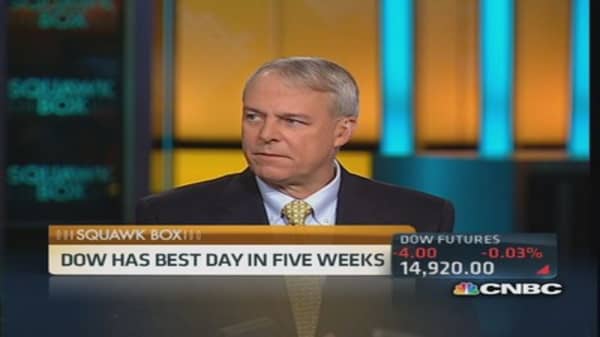Financial markets can handle higher bond yields as long as they're for the "right reasons," Drew Matus, senior U.S. economist and managing director at UBS, told CNBC.
The yield on the 10-year Treasury traded at two-year highs on Thursday, inching ever closer to the psychologically key 3 percent level, after two reports indicated an improving jobs picture ahead of Friday's release of the government's August employment report.
Yields nudged even higher after the ISM non-manufacturing survey showed a higher-than-expected level of services sector orders and activity for August.
(Read more: Private jobs growing, while weekly claims falling)
"When yields move up for the right reasons—whether the Fed wants them to or not—the market can tolerate that much better," Matus said in a "Squawk Box" interview.
Yields have been higher across the curve, both because of the prospect of the Fed pulling back on bond purchases and improving economic data.
At the shorter end, the yield on the two-year Treasury rose Thursday to 0.52 percent for the first time since June 2011. The 10-year yield jumped to 2.97 percent, its highest yield in more than two years.
The Federal Reserve has said it plans to keep short-term interest rates near zero for the foreseeable future, but bond traders seem to have a different idea of where rates should be and even the shorter duration yields are moving higher. And while Fed policymakers have said repeatedly that tapering its massive asset purchase program is not tightening, the market also seems to think otherwise.
"The biggest risk, in my opinion, is if the Fed tries to push back against this market move," Matus argued.
Friday's August employment report is last major piece of economic data ahead of the Fed's September meeting, at which many economists expect the central bank to start to scale back its $85 billion-a-month bond buying.
"[If] the Fed tries to reinforce its control over markets and decides to put off the taper in order to basically teach markets a lesson, that's just a bad sign," Matus added. "It would get all the people worried about inflation, much more worried about inflation."
During a speech Wednesday, San Francisco Fed President John Williams said the data suggest that recent declines in inflation to well below the Fed's 2 percent target are probably temporary, and could start to move up gradually as the unemployment rate trends lower.
But Minneapolis Fed President Narayana Kocherlakota said that the lack of inflation signals that the Fed should continue to add stimulus.
Inflation can be a self-fulfilling prophecy, Matus explained. "People can think those inflation warriors are crackpots, but … they actually help to drive market expectations for inflation going forward, which then feeds into actual inflation."
"In some ways, if people believe inflation can happen, then it can happen," he concluded.
—By CNBC's Matthew J. Belvedere. Follow him on Twitter @Matt_SquawkCNBC.




